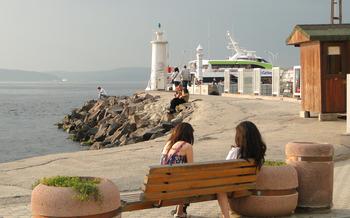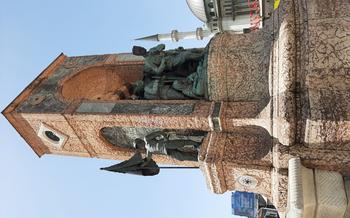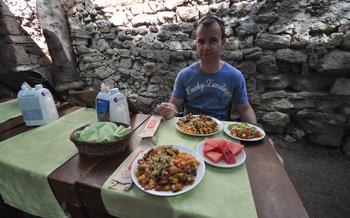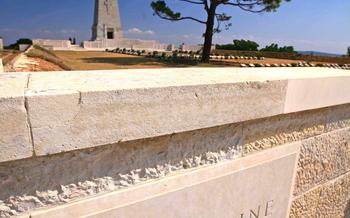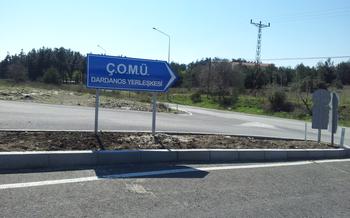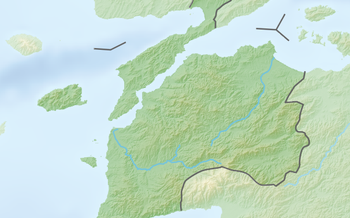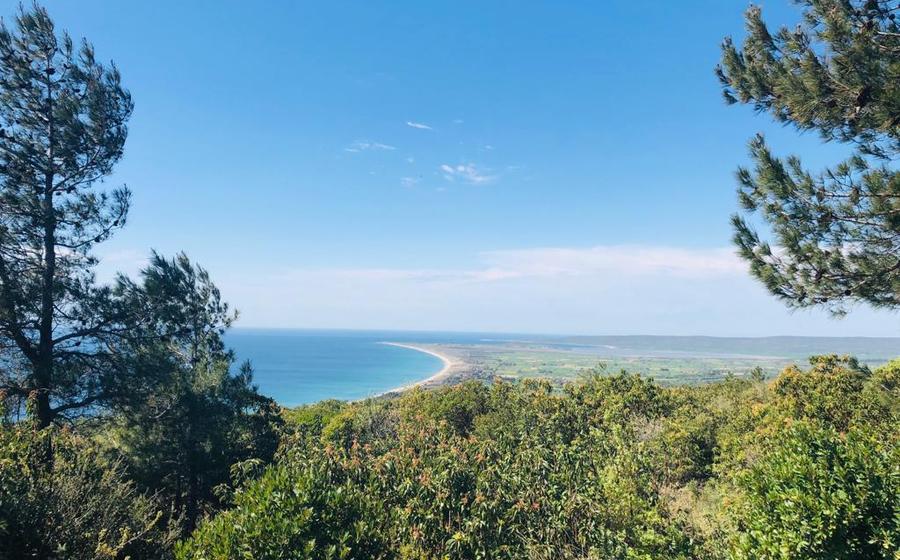
Adatepe Olive Oil Museum
- Adatepe Olive Oil Museum: A Journey into Culinary History
- Immerse Yourself in Olive Oil Lore
- Delve into Olive Oil Production
- Discover the Health Benefits of Olive Oil
- Savor the Flavors of Olive Oil Tasting
- Unveiling the Secrets of Olive Oil Classification
- Explore the Surrounding Olive Groves
- Engage with the Museum's Educational Programs
- Delight in Local Olive Oil Products
- Uncover the History of Adatepe
- Embrace Sustainable Olive Oil Practices
- Capture Memorable Moments
- Savor the Culinary Delights of Çanakkale
- Insider Tip: Dive into the Olive Festival
Adatepe Olive Oil Museum: A Journey into Culinary History
The Adatepe Olive Oil Museum is a one-of-a-kind institution that takes visitors on a captivating journey through the history, culture, and production of olive oil in Turkey. Housed in a beautifully restored olive mill, the museum showcases a unique collection of olive oil-making tools and machinery, providing a glimpse into the ancient techniques and traditions that have shaped this culinary staple.
Interactive exhibits engage visitors of all ages, allowing them to experience the process of olive oil extraction firsthand and learn about the different methods used throughout history, from traditional stone mills to modern centrifugal systems. The museum also offers a rich collection of historical documents, photographs, and artifacts that tell the story of olive oil production in Turkey, highlighting its deep-rooted cultural significance and its role in shaping the country's culinary identity.
Immerse Yourself in Olive Oil Lore
Olive cultivation in Turkey boasts a rich and storied past, dating back to the ancient civilizations that once flourished on these lands. In Turkish culture, the olive tree holds a profound symbolic significance, representing wisdom, abundance, and peace. It is deeply woven into the fabric of Turkish folklore, mythology, and traditions.
In traditional Turkish cuisine, olive oil plays an indispensable role. Its distinct flavor and health benefits have made it a staple ingredient in many beloved dishes, from savory stews and mezes to delicate pastries and desserts. Olive oil is not merely a culinary delight; it is an integral part of the Mediterranean diet, renowned for its health-promoting properties.
Delve into Olive Oil Production
The Adatepe Olive Oil Museum takes visitors on a comprehensive journey through the fascinating world of olive oil production. From ancient techniques to modern methods, the museum showcases the evolution of olive oil extraction.
Traditional Methods:
-
Harvesting: Learn about the traditional methods of harvesting olives, including handpicking and using nets to collect fallen olives.
-
Pressing: Witness the centuries-old stone mills used to crush olives into a paste. Explore the process of extracting oil from the paste using traditional presses.
Modern Techniques:
-
Centrifugation: Discover the modern technique of centrifugation, which involves spinning the olive paste at high speeds to separate the oil from other components.
-
Continuous Extraction: Explore the continuous extraction process, where olives are crushed and mixed with water to create a continuous flow of oil.
-
Cold-Pressing: Understand the importance of cold-pressing, which preserves the oil's natural flavor and nutrients by avoiding the use of heat.
Discover the Health Benefits of Olive Oil
Olive oil has been a staple of the Mediterranean diet for centuries and is renowned for its numerous health benefits. Scientific studies have consistently shown that regular consumption of olive oil can positively impact overall health.
One of the key benefits is its high concentration of antioxidants. These compounds help protect cells from damage caused by free radicals, which are unstable molecules that can contribute to aging and the development of chronic diseases.
Olive oil has also been shown to have potential benefits for cardiovascular health. Its monounsaturated fats, particularly oleic acid, have been linked to reduced levels of LDL (bad) cholesterol and increased levels of HDL (good) cholesterol. This can help reduce the risk of heart disease, stroke, and other cardiovascular problems.
In addition, olive oil may play a role in promoting a healthy Mediterranean diet, which has been associated with a lower risk of obesity, type 2 diabetes, and certain types of cancer. The combination of healthy fats, antioxidants, and other nutrients in olive oil contributes to its overall health-promoting effects.
So, whether you're drizzling it over salads, using it as a cooking oil, or incorporating it into your favorite recipes, olive oil can be a delicious and nutritious addition to your diet.
Savor the Flavors of Olive Oil Tasting
The Adatepe Olive Oil Museum offers a unique and immersive experience through its organized olive oil tasting sessions. Guided by knowledgeable experts, visitors embark on a sensory journey to discover the nuances and complexities of different olive oil varieties.
During these sessions, participants learn how to identify the various characteristics that set apart high-quality olive oil. They explore the diverse flavor profiles, ranging from fruity and herbaceous to peppery and bitter, and gain an understanding of the factors that influence these variations.
Through hands-on tasting and expert guidance, visitors develop the skills to discern the subtle differences between different olive oil samples. They learn to appreciate the rich aromas, delicate textures, and lingering finishes that make each variety unique.
These tasting sessions provide a deeper appreciation for the craftsmanship and artistry involved in olive oil production. Visitors leave the museum with a newfound understanding of the complexities of this liquid gold and the ability to make informed choices when selecting and using olive oil in their own kitchens.
Unveiling the Secrets of Olive Oil Classification
The Adatepe Olive Oil Museum delves into the intricate world of olive oil classification, shedding light on the international standards that determine the quality and grade of this liquid gold. Visitors are introduced to the three main categories of olive oil: extra virgin, virgin, and refined.
Extra Virgin Olive Oil: Renowned for its superior quality, extra virgin olive oil is extracted using mechanical methods without the use of chemicals or excessive heat. It possesses a low acidity level, typically below 0.8%, and boasts a rich, fruity flavor profile.
Virgin Olive Oil: Falling just short of the extra virgin category, virgin olive oil is obtained through similar mechanical processes but may have a slightly higher acidity level, up to 2%. It retains a pleasant flavor and aroma, making it a versatile choice for cooking and drizzling.
Refined Olive Oil: Refined olive oil undergoes a purification process to remove impurities and reduce acidity. It is typically blended with virgin olive oil to create a more neutral flavor and is commonly used for frying and other high-heat cooking applications.
The museum's exhibits provide an in-depth look at the factors that influence olive oil quality, including the olive variety, growing conditions, harvesting methods, and extraction techniques. Visitors gain an understanding of the importance of acidity levels, which indicate the oil's freshness and purity, as well as the role of taste characteristics in determining the overall quality of the oil.
Explore the Surrounding Olive Groves
Venture beyond the museum walls and immerse yourself in the picturesque olive groves that surround Adatepe. Join a guided tour to delve into the local olive farming practices and discover the diverse varieties of olive trees that thrive in this region. Stroll through the rows of ancient trees, learning about their history and significance. Witness the traditional harvesting process, where farmers carefully handpick the ripe olives, ensuring the preservation of the fruit's delicate flavors. The beauty of the olive landscapes, with their silvery-green foliage and the backdrop of rolling hills, will captivate your senses and create lasting memories of your visit.
Engage with the Museum's Educational Programs
The Adatepe Olive Oil Museum offers a range of educational programs designed to deepen your understanding of olive oil and its significance. Participate in hands-on workshops where you can learn the intricacies of olive oil production, from harvesting and pressing to tasting and grading. Gain insights into the health benefits of olive oil through informative lectures delivered by olive oil experts. Enjoy cooking demonstrations that showcase the versatility of olive oil in traditional Turkish cuisine. The museum also organizes educational activities for children and families, making it an ideal destination for a fun and educational day out.
Delight in Local Olive Oil Products
The Adatepe Olive Oil Museum offers a unique opportunity to sample a variety of olive oil-based products that showcase the culinary traditions of the region. Visitors can indulge in the flavors of savory olive oil soaps, natural cosmetics, and culinary delights like olive oil cakes and desserts. These products are handcrafted using the finest local ingredients, ensuring authenticity and quality.
In the museum's gift shop, you can find an array of olive oil-based products that make for excellent souvenirs or gifts for loved ones back home. From aromatic soaps infused with olive oil's nourishing properties to natural cosmetics that harness the antioxidant power of olives, there's something for everyone.
Don't miss the chance to savor traditional Turkish olive oil dishes in local restaurants around Adatepe. These culinary creations showcase the versatility and flavor of olive oil, from classic dishes like zeytinyağlı yaprak sarması (stuffed grape leaves with olive oil) to innovative creations that blend traditional flavors with contemporary culinary techniques.
Indulge in the sweet side of olive oil with a variety of olive oil-based desserts. From the delicate flavors of olive oil cakes to the rich sweetness of olive oil ice cream, these treats offer a unique and delightful way to experience the culinary wonders of this liquid gold.
Uncover the History of Adatepe
Beyond the walls of the Adatepe Olive Oil Museum, the quaint village of Adatepe awaits exploration. Steeped in history and cultural heritage, Adatepe is an integral part of the region's olive oil legacy. Stroll through its narrow cobblestone streets and discover charming Ottoman-era houses, each with a tale to tell. Visit the village mosque, with its intricate tilework and serene atmosphere, and marvel at the picturesque views of the surrounding countryside from the village square. Learn about Adatepe's role in olive oil production, as local farmers have for generations cultivated olive groves on the fertile slopes surrounding the village. Experience the warm hospitality of the Adatepe community, known for its friendly locals and traditional Turkish customs. Immerse yourself in the village's rich history, culture, and the enduring spirit of olive oil that permeates the essence of Adatepe.
Embrace Sustainable Olive Oil Practices
The Adatepe Olive Oil Museum not only delves into the history and production of olive oil but also sheds light on sustainable practices in olive farming. Visitors can learn about the importance of preserving biodiversity and soil health in olive groves. The museum highlights the significance of traceability and transparency in the olive oil industry, promoting ethical practices from farm to table. By supporting local farmers and understanding the environmental impact of olive oil production, visitors can contribute to a more sustainable future for the industry.
Capture Memorable Moments
The Adatepe Olive Oil Museum provides ample opportunities to capture memorable moments and share your experiences with others. Take advantage of the many photogenic spots throughout the museum, from the traditional olive oil-making equipment to the picturesque olive groves that surround the property. Don't miss the chance to capture the essence of this unique cultural destination through your lens.
Share your experiences on social media using the hashtag #AdatepeOliveOilMuseum to connect with fellow olive oil enthusiasts and inspire others to embark on their own culinary journey. Create lasting memories of your visit by documenting the sights, sounds, and flavors of this exceptional museum. From the interactive exhibits to the breathtaking views, the Adatepe Olive Oil Museum offers a wealth of moments worth capturing.
Savor the Culinary Delights of Çanakkale
Beyond the walls of the Adatepe Olive Oil Museum, the culinary adventures continue in the vibrant city of Çanakkale. Embark on a gastronomic journey, tantalizing your taste buds with authentic Turkish cuisine and regional delicacies infused with the flavors of olive oil.
Explore local restaurants nestled in the heart of Çanakkale, where skilled chefs weave their culinary magic, creating dishes that showcase the versatility and depth of olive oil. Savor traditional Turkish fare, such as succulent grilled meats, aromatic stews, and freshly baked bread, all lovingly prepared with generous amounts of high-quality olive oil.
Indulge in regional specialties like "Çanakkale Kofte," succulent meatballs simmered in a rich tomato sauce infused with olive oil, or "Patlıcanlı Kuzu," tender lamb stewed with eggplant and, of course, olive oil.
Don't miss the opportunity to sample the local street food, where vendors offer tantalizing treats like "Çiğ Köfte," a spicy bulgur-based dish drizzled with olive oil, and "Midye Dolma," succulent stuffed mussels bathed in a flavorful olive oil sauce.
As you explore Çanakkale's culinary scene, discover the vibrant atmosphere of the local markets, where vendors proudly display their fresh produce, including an array of olives and olive oil varieties. Engage with the friendly locals, who are passionate about sharing their culinary traditions and the stories behind each dish.
Whether you're a seasoned foodie or simply seeking a taste of authentic Turkish cuisine, Çanakkale offers a culinary adventure that will leave a lasting impression on your palate.
Insider Tip: Dive into the Olive Festival
For an unforgettable experience, plan your visit to the Adatepe Olive Oil Museum during the annual Olive Festival, typically held in Çanakkale during the harvest season. This vibrant celebration pays homage to the region's rich olive oil heritage and offers a unique opportunity to immerse yourself in local culture.
Witness the lively olive oil competitions as producers from across the region showcase their finest extra virgin olive oils. Participate in hands-on workshops that delve deeper into olive oil production, tasting, and culinary applications. Savor the flavors of traditional Turkish dishes prepared with fresh, locally produced olive oil.
The festival also features cultural performances, live music, and exhibitions showcasing the history, traditions, and innovations of olive oil making in Çanakkale. Immerse yourself in the warm hospitality of the local community and gain a deeper appreciation for the region's liquid gold.
